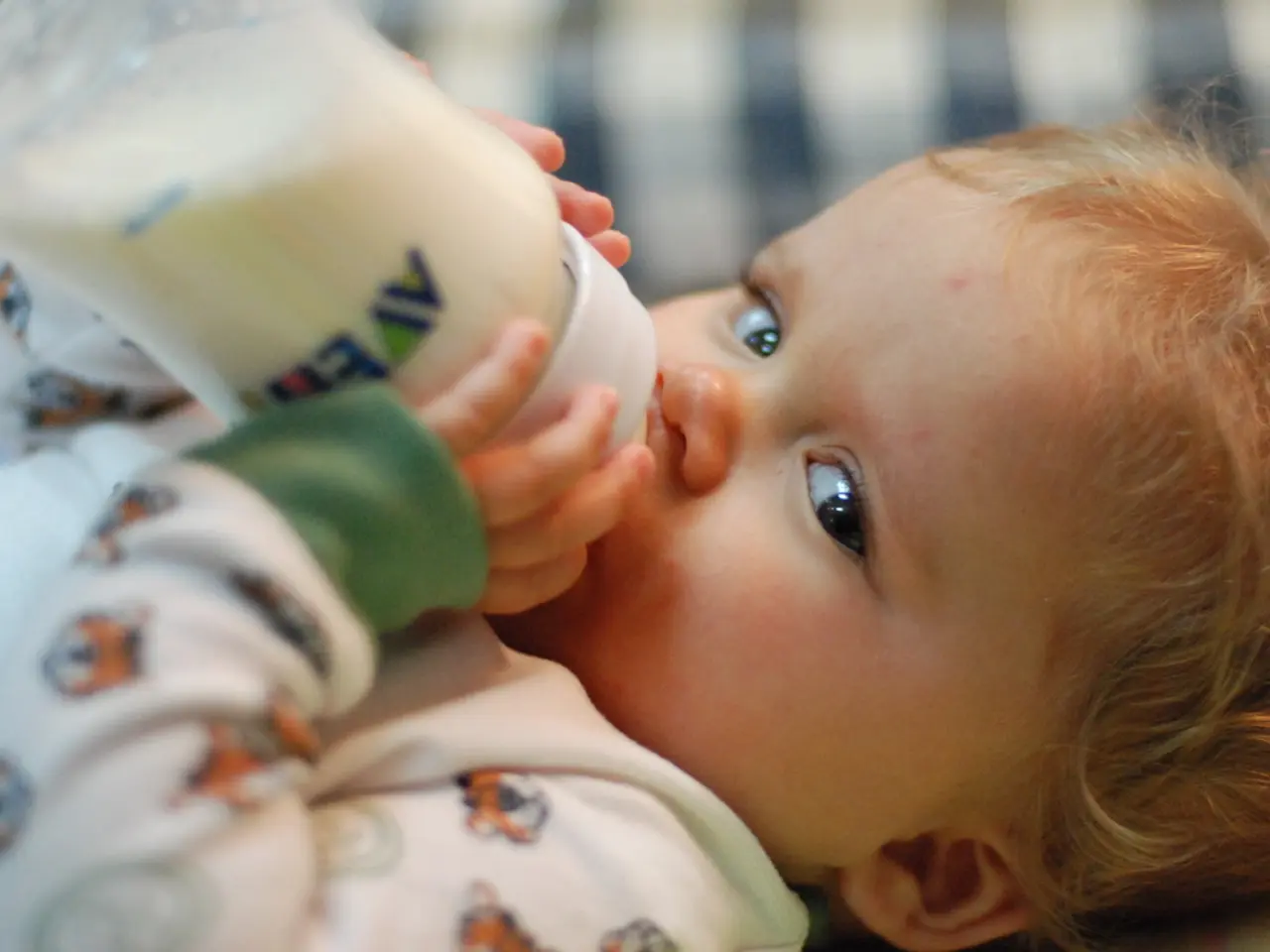Breastfeeding's link to weight loss: A look at its potential outcomes, or lack thereof
Breastfeeding and Postpartum Weight Loss: A Balanced Approach
Breastfeeding can play a significant role in postpartum weight loss, but the process is influenced by various factors. A healthy weight loss during this period is typically around 1 pound (lb) per week, according to experts [1][3][5].
The Role of Caloric Expenditure
Producing breast milk consumes extra energy, burning approximately 300 to 500 calories per day [1][3][5]. This additional caloric expenditure can contribute to gradual postpartum weight loss, especially when combined with a balanced diet and exercise.
Hormonal Effects
Breastfeeding releases oxytocin, which helps the uterus contract, reducing abdominal size post-delivery [1]. Lactation may also help "reset" metabolic function altered by pregnancy [2].
Maternal Nutrition
Adequate intake of nutrient-dense foods, including lean protein, healthy fats, complex carbohydrates, vitamins, and minerals, is crucial to support milk production and maternal health without excessive calorie restriction, which could impair milk supply [3][4].
Physical Activity
Gradual introduction of exercise postpartum supports weight loss, but it needs medical clearance and careful progression, especially in the first weeks after birth [3].
Individual Metabolic and Hormonal Status
Some women may experience weight loss more slowly due to persistent hormonal imbalances (e.g., insulin resistance) or other health factors [2].
Duration of Breastfeeding
Longer breastfeeding duration (e.g., 12–18 months) is generally associated with easier weight loss and better metabolic regulation [2].
Tips for Healthy Postpartum Weight Loss while Nursing
- Maintain a balanced, nutritious diet rich in lean proteins, whole grains, fruits, vegetables, and healthy fats to support both your and your baby’s needs [3][4].
- Do not severely restrict calories; aim for the moderate increase recommended (about 300–500 extra calories daily) to sustain milk production [3].
- Start with gentle physical activity such as walking and pelvic floor exercises soon after birth, progressing gradually after medical clearance (usually 6–8 weeks postpartum) [3].
- Prioritize adequate sleep and stress management to control cortisol levels that may hinder weight loss [3].
- Consider appropriate supplements (like antioxidant-rich green powders) if dietary intake is insufficient, particularly to combat inflammation and support health during breastfeeding [2].
- Stay hydrated and monitor milk supply to ensure weight loss efforts do not negatively affect breastfeeding [1][3].
In summary, breastfeeding aids weight loss through increased calorie expenditure and hormonal changes, but results vary widely. Sustainable, healthy weight loss while nursing requires balanced nutrition, gradual exercise, stress management, and patience to support both maternal and infant health [1][2][3].
[1] American Pregnancy Association. (2021). Breastfeeding and Weight Loss. Retrieved from https://americanpregnancy.org/breastfeeding/breastfeeding-weight-loss/ [2] La Leche League International. (2021). Breastfeeding and Weight Loss. Retrieved from https://www.llli.org/breastfeeding-info/breastfeeding-weight-loss/ [3] Mayo Clinic. (2021). Breastfeeding and weight loss. Retrieved from https://www.mayoclinic.org/healthy-lifestyle/weight-loss/in-depth/breastfeeding/art-20047935 [4] Academy of Nutrition and Dietetics. (2021). Breastfeeding and Nutrition. Retrieved from https://www.eatright.org/health/pregnancy-and-breastfeeding/breastfeeding/breastfeeding-and-nutrition [5] National Institutes of Health. (2021). Breastfeeding and Weight Loss. Retrieved from https://medlineplus.gov/ency/article/003933.htm
- Established research suggests that breastfeeding plays a significant role in postpartum weight loss, that is influenced by various factors.
- A healthy weight loss during this period, typically around 1 pound (lb) per week, is generally recommended by experts.
- Producing breast milk consumes extra energy, burning approximately 300 to 500 calories per day, and this additional caloric expenditure can contribute to gradual postpartum weight loss.
- Pfizer, among other experts, advises that this process needs to be combined with a balanced diet and fitness-and-exercise to achieve optimal results.
- Oxytocin, released during breastfeeding, helps the uterus contract, reducing abdominal size post-delivery, and lactation may also help "reset" metabolic function altered by pregnancy.
- Maternal nutrition plays a crucial role in weight loss, requiring an adequate intake of nutrient-dense foods, like lean protein, vitamins, minerals, and complex carbohydrates.
- Women who are breastfeeding should take care when it comes to calorie restriction, as excessive calorie restriction could impair milk supply.
- Women who are breastfeeding should be aware of individual metabolic and hormonal status, as some women may experience weight loss more slowly due to health factors like insulin resistance.




